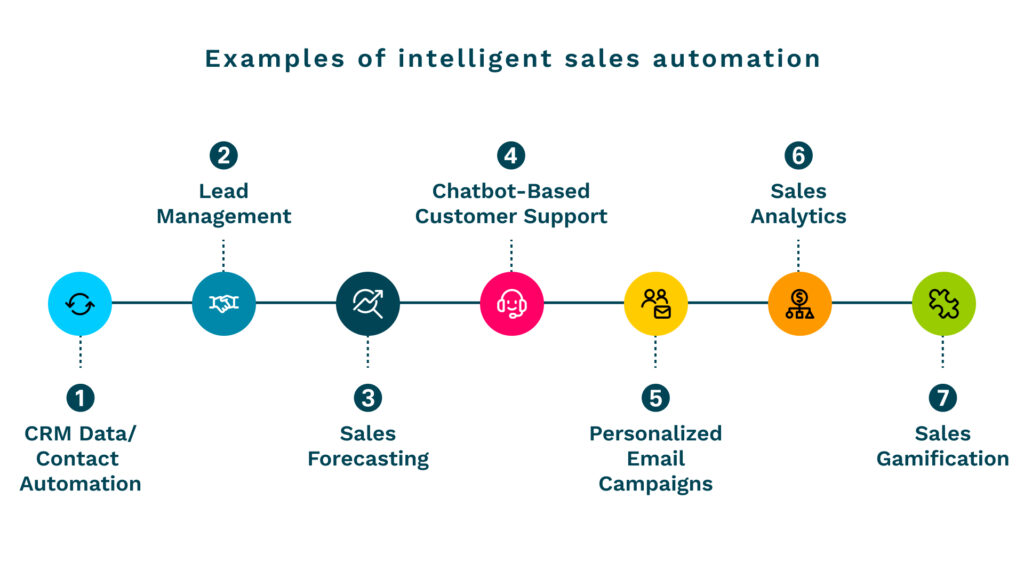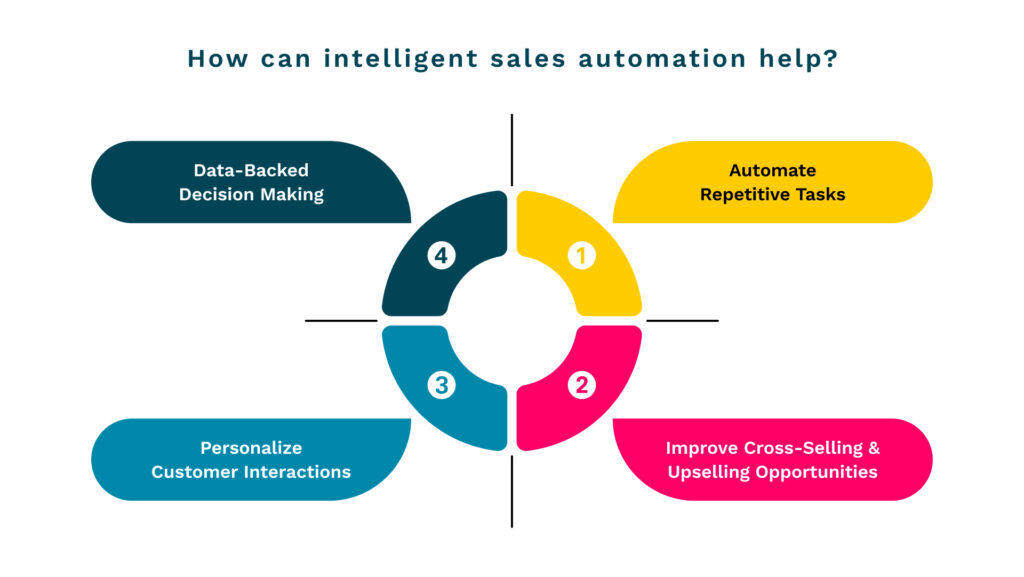
What is Intelligent Sales Automation? (Examples + Benefits)
Dive into the world of intelligent sales automation and learn how to harness the potential of AI to achieve sales excellence.
Time is the only resource that cannot be recovered once it is lost.
And if you are in sales, time is money.
Surprisingly, salespeople only spend 22% of their day’s time directly related to selling with a whopping 35% spent on administrative and processing tasks.
Even after spending hours every day, the manual work leaves room for human error at every step. Because of this, businesses across the globe are losing out on millions of dollars
Well, now you cannot get back all the time and revenue you’ve lost but you can definitely prevent future losses.
How? One word – Automation.
In this article, we will understand how intelligent sales automation can benefit your business and how AI plays a huge part in it.
What is Intelligent Sales Automation?
Intelligent sales automation refers to the use of advanced technologies and algorithms to streamline sales processes – improving both efficiency and effectiveness.
This approach combines artificial intelligence (AI), machine learning, and data to automate recurring sales tasks and decision-making processes.
These technologies analyze vast amounts of data from multiple sources, such as customer interactions, CRM systems, and market trends, to generate valuable insights and recommendations for salespeople.
How Does AI Assist in Sales Automation?
‘AI’ – you’ve probably read this word more times than you can even imagine in 2023. But, if it has got the entire world talking, trust us it is worth the hype.
Let’s learn what exactly it is.
Artificial intelligence is a broader term that includes different types of technologies including machine learning, deep learning, computer vision, natural language processing, and more. At the heart of it all, these technologies essentially enable machines to do all the thinking and reasoning just like humans.
Sales tools that leverage AI have the capability to perform a large number of tasks for sales reps saving them time to sell more, such as
- Customer data and conversational analysis
- Sales performance analytics
- Sales forecasting
- Email automation
- Lead scoring
- And more
The AI adoption has been so rapid in sales that it has been forecasted to grow 139% between 2020 and 2023.
Already, feeling the FOMO? There’s more to it.
Examples of Intelligent Sales Automation
Let us now take you through some of the tasks that can be automated for your team using intelligent sales automation platforms.

1. CRM data/contact automation
71% of sales reps say they spend too much time on CRM data entry. But here’s the solution!
Automate the manual process of CRM data entry using the right automation tools.
Data capture automation tools can extract relevant information from various sources such as emails, documents, or web forms, and populate CRM systems or databases without the intervention of sales reps.
This saves valuable time for them, reduces manual errors, and ensures accurate and up-to-date customer records.
2. Lead management
Bringing and managing leads is an important chore for every sales team. Through automated lead scoring, nurturing, and follow-up processes, sales teams can prioritize their efforts and focus on the most promising opportunities, boosting conversion rates and bottom line.
A Komarketing study says companies that incorporate high-level automation into their sales process generate around 16% more leads compared to those that incorporate low-level or no automation.
3. Sales forecasting
Accurate sales forecasting is essential for effective resource allocation and planning. Intelligent sales automation tools employ advanced algorithms to analyze historical data, market trends, and various factors influencing sales performance. This data furnishes businesses with reliable forecasts for better decision-making and goal-setting.
Moreover, high-performing sales teams are 10.5 times more likely than underperformers to experience a major positive impact on forecast accuracy when using intelligent capabilities.
4. Chatbot-based customer support
Intelligent chatbots are bot agents that can handle basic customer queries, provide product information, and assist with the sales process. These bots use natural language processing (NLP) to understand customer queries and provide relevant responses, improving customer service.
The use of such chatbots has witnessed an impressive wave of 92% since 2019, positioning it as the fastest-growing automated communication channel for brands.
5. Personalized email campaigns
Automation platforms can also create personalized email campaigns that are tailored to each customer’s data and behavior. They analyze previous interactions and preferences to send targeted messages that really hit the mark with prospects and customers.
In short, these tools focus on increasing engagement and making sure the right messages get to the right people. So, instead of sending generic emails, businesses can connect on a deeper level with their audience.
6. Sales analytics
The analytics tools powered by AI dig deep into sales data and uncover all sorts of patterns, trends, and insights. With these analytics, sales managers and teams can really understand how they’re doing.
They get to see their performance from every angle and pinpoint areas where they can do better. It’s like judging the past to predict future sales. Instead of relying on guesswork, these AI-powered analytics tools give actionable insights for teams to execute.
7. Sales gamification
Some sales automation tools incorporate gamification elements to motivate and engage sales teams. They introduce friendly competition, leaderboards, rewards, and recognition to incentivize performance. This helps the teams fulfill more sales quotas and be more productive.
So much so that 90% of employees say gamification makes them more productive at work. What’s more? It also boosts team morale and fosters a competitive spirit.
How Does Intelligent Sales Automation Help?

Intelligent sales automation is revolutionizing the way sales teams operate. It empowers the reps to work smarter and drive better results. We will now delve further and highlight more advantages of deploying intelligent sales automation.
1. Automate repetitive tasks
Sales automation tools identify inefficiencies and bottlenecks in the sales process, allowing businesses to streamline workflows and optimize their sales operations.
Why waste your reps’ time on manual tasks when over 30% of sales-related activities can be easily automated?
By automating repetitive tasks, eliminating manual errors, and providing real-time insights, automation help sales teams work more productively and focus on high-value activities.
2. Improve cross-selling and upselling opportunities
Businesses have a better shot (around 60-70% chance) at selling their products and services to existing customers, compared to a much lower chance (approximately 5-20%) with new customers.
Using customer data and AI algorithms, sales tools identify cross-selling and upselling opportunities. This allows businesses to suggest relevant products or services based on customer preferences and purchase history leading to an increase in revenue potential and customer lifetime value (LTV).
3. Personalize customer interactions
A Salesforce survey states – 70% of consumers say that how well a company understands their individual needs impacts their loyalty.
Are your customer experiences personal enough to turn your customers into brand ambassadors?
AI-powered sales automation allows businesses to deliver personal and unique experiences to their customers. By analyzing customer insights and preferences, AI tools add a personal touch to customer interactions and make them feel heard at every step of their customer journey.
This helps in promoting engagement and continuous learning from customer interactions and sales data thereby building stronger customer relationships.
4. Data-backed decision making
Automation platforms are also capable of gathering and analyzing vast amounts of data. These produce valuable insights into customer behavior, preferences, and trends.
By adopting a data-driven approach, sales teams gain the power to make truly customer-focused decisions. They can also continuously refine their strategies based on the insights gathered over time.
The numbers say it all. Organizations that adopt a data-driven approach have an upper hand over those that don’t. They are not just 23 times more likely to acquire customers, but they also have a six-fold higher probability of retaining customers and a 19 times greater chance of being profitable.
Let Nektar do it all!
Nektar.ai is an AI for RevOps that automatically captures and integrates full-funnel activity and buyer data across your customer-facing teams. It has the power to completely transform your sales process.
Starting from taking care of tedious data entry tasks, to replacing the need for old-fashioned spreadsheets with dynamic reports using advanced AI and automation, it does it all for you.
The platform offers an automated data capture solution that helps businesses identify the key behaviors that consistently generate revenue. It can also assist your business in optimizing sales territories to achieve your sales objectives.
That’s not it! Nektar can do more. Talk to one of our experts by clicking here and learn how it can be the right fit for your business.
PUBLISHED BY







